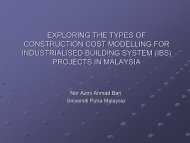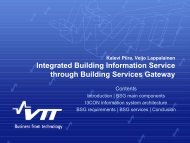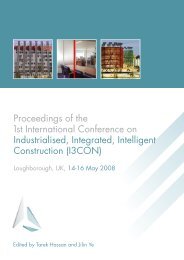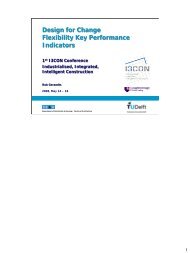Industrialised, Integrated, Intelligent sustainable Construction - I3con
Industrialised, Integrated, Intelligent sustainable Construction - I3con
Industrialised, Integrated, Intelligent sustainable Construction - I3con
Create successful ePaper yourself
Turn your PDF publications into a flip-book with our unique Google optimized e-Paper software.
SUSTAINABLE CONSTRUCTION HANDBOOK 2<br />
Figure 6. Does FM ensure the design of a new building meets the needs of the end-user?<br />
The literature review highlighted the importance of the brief within the early project stages and the<br />
challenge when the end-user is unknown at the time of design. 81% of all respondents from a<br />
construction background claim that the knowledge of FM is not utilised at the briefing and design<br />
phases. Interestingly, FMs are said to be able to inform the construction process of end-user<br />
requirements and therefore present advantages to the process. Therefore, their lack of integration must<br />
be linked with the barriers. 39% of respondents agree that the FM can ensure the design of a new<br />
building meets the needs of the end-user, yet 81% highlight that their knowledge is not utilised.<br />
To understand the barriers restricting the inclusion of FM at the briefing and design phases of a<br />
construction project, the questionnaire administered to the construction industry included this<br />
parameter. Figure 7 shows the top three barriers within the questionnaire include client constraints<br />
(67%), lack of awareness of the parties involved (52%) and lack of knowledge (48%). The question<br />
included an open ended section to answer other possible barriers. The lack of information provides the<br />
assumption that the main barriers fall around these key areas. Client constraints are at a significantly<br />
higher level than other results which can be linked to the barriers to effective sustainability<br />
management. Clients are the driving force within construction projects as they usually pay for the<br />
operations and require certain specifications and design levels, even if they are not the end-users. The<br />
lack of awareness of the parties involved can be linked with the lack of awareness of what FM and<br />
sustainability actually incorporates and how it can contribute.<br />
The lack of knowledge of FM is a significant barrier which has been highlighted in much of the<br />
literature in the research, such as the work of Sunil Shah. This lack of knowledge can be focused<br />
around the lack of adequate knowledge of the construction processes, lack of knowledge of design<br />
factors and the lack of knowledge of end-user requirements. This can also be interpreted as the lack of<br />
knowledge of other construction professionals of the benefits the FM can bring at the design phases of<br />
construction. If the FMs do not have the knowledge of design and the requirements of the end-user,<br />
then their use within the early stages of the construction is severely limited and would provide little or<br />
no benefit.<br />
Financial constraints are a significant barrier for 43% of the construction organisations responding to<br />
the survey. Financial constraints can be linked to the cost of the services provided by the FMs and the<br />
perceived added costs of changing the traditional processes. If the knowledge of FM is brought into<br />
the construction process from a service providing organisation, then there is a potential debate<br />
between the professionals. Will the added costs be picked up by the design team in which the FM is<br />
adding to the process or the client who is developing the new facility? Time constraints are significant<br />
within 24% of organisations and linked with the tight timescales within all construction projects and<br />
the limitation of including operational knowledge at this stage.<br />
226






